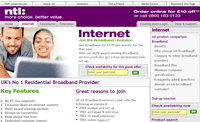 After a period of speculation, a press release on UK cable company NTL’s Web site makes it official that they intend to move their customers to broadband connection “up to 10Mb as standard.”
After a period of speculation, a press release on UK cable company NTL’s Web site makes it official that they intend to move their customers to broadband connection “up to 10Mb as standard.”
Don’t get too excited yet. Clearly that could mean anything, even 2,400 baud fits into that category.
NTL tell us that they will be first upgrading their current 3Mb customers to the 10Mb service, while expanding these customer download restirctions form 30Gb/month to 75Gb.
We at Digital-Lifestyles hate a limit on traffic – we see it as another way to extract cash from punters when they start to have their TV/video content delivered via their broadband – an extra reason for a cable TV company to restrict you.
Well, when this all going to happen? It’s pretty unclear, but according to NTL, ‘by the end of 2006, the roll out of this new product portfolio will be complete,’ which gives them a lot of leeway doesn’t it?
 We think it may be some time before this actually gets to the customers, as NTL are also talking of introducing an interim service, ‘The Turbo Button,’ which will burst a connection to higher speeds, when customers are downloading bandwidth heavy content like video.
We think it may be some time before this actually gets to the customers, as NTL are also talking of introducing an interim service, ‘The Turbo Button,’ which will burst a connection to higher speeds, when customers are downloading bandwidth heavy content like video.
NTL and their broadband service have for a very long time been damned by many of their subscribers, past and present. They were recently voted the very worst broadband provider in the UK in a poll of member by the consumers organisation, Which?
Such dreadful service lead one particular subscriber, Bryan Stevens, to take action online four years ago, forming ntl:hell, a news and discussion board that was solely focused on how bad NTL’s service was. Its membership expanded at a frightening rate … up to the point were NTL offered Mr Stevens a job running the board for ‘the good of NTL subscribers’. A look at the discussion board today give a clear indication of how effective embarassing your harshest critics works.
Many of you will already know that the person who was managing director and chief operation officer at NTL during the time ntl:hell was born – Stephen Carter. He now runs the UK super regulator OfCom.
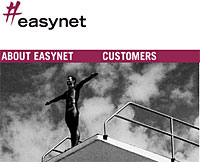 Like Popeye with a mouthful of spinach, broadband providers Easynet have barged BT out of the way to claim a lucrative three-year deal to supply wholesale broadband services to Onetel, Centrica’s telecommunications division.
Like Popeye with a mouthful of spinach, broadband providers Easynet have barged BT out of the way to claim a lucrative three-year deal to supply wholesale broadband services to Onetel, Centrica’s telecommunications division. Ian El-Mokadem, Managing Director, Onetel sounded chuffed with the deal: “The partnership with Easynet will allow us to deploy next generation broadband services and benefit from Local Loop Unbundling economics. The market is set to evolve rapidly and we wanted a partner that could demonstrate experience in the local loop, and a willingness to work in a true partnership.
Ian El-Mokadem, Managing Director, Onetel sounded chuffed with the deal: “The partnership with Easynet will allow us to deploy next generation broadband services and benefit from Local Loop Unbundling economics. The market is set to evolve rapidly and we wanted a partner that could demonstrate experience in the local loop, and a willingness to work in a true partnership.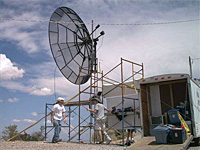 Those of you struggling to maintain a Wi-Fi connection from next door’s access point may be exclaiming a Victor Meldrew-style, “I don’t belieeeeve it!” at the news of a mighty new world record being set for an unamplified Wi-Fi link.
Those of you struggling to maintain a Wi-Fi connection from next door’s access point may be exclaiming a Victor Meldrew-style, “I don’t belieeeeve it!” at the news of a mighty new world record being set for an unamplified Wi-Fi link.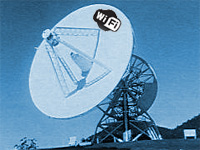 There is now talk of attempts to smash the current Bluetooth record of 1.08 miles.
There is now talk of attempts to smash the current Bluetooth record of 1.08 miles.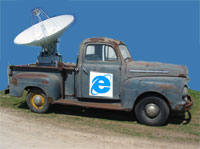 Trying to work out the law surrounding this Wi-Fi malarkey seems to be a tricky business.
Trying to work out the law surrounding this Wi-Fi malarkey seems to be a tricky business.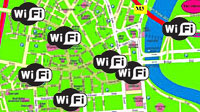 According to an article in the Financial Times, Microsoft says it has now built a database containing the whereabouts of “millions” of WiFi networks.
According to an article in the Financial Times, Microsoft says it has now built a database containing the whereabouts of “millions” of WiFi networks. The long-awaited results from the Welsh Digital TV trial were published today.
The long-awaited results from the Welsh Digital TV trial were published today.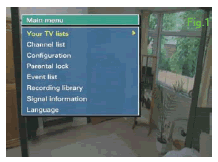 The digital signal was switched on in November 2004, running simultaneously with current analogue for three month.
The digital signal was switched on in November 2004, running simultaneously with current analogue for three month.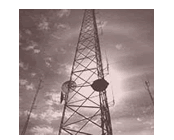 Transmission and Coverage – No one lost their TV service during the trial. Only three homes, which were previously in poor reception areas, could not receive the digital service and these were given a digital satellite service. Broadband was introduced during the trial and is seen as an alternative form of delivery to satellite.
Transmission and Coverage – No one lost their TV service during the trial. Only three homes, which were previously in poor reception areas, could not receive the digital service and these were given a digital satellite service. Broadband was introduced during the trial and is seen as an alternative form of delivery to satellite.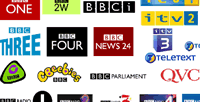 Content – Having an EPG went down well with the residents, particular when they used it to record programs on their PVR. The trialists also enthused about the ability to receive extra TV channels – after all the major benefit to consumer if the expanded choice they will be given.
Content – Having an EPG went down well with the residents, particular when they used it to record programs on their PVR. The trialists also enthused about the ability to receive extra TV channels – after all the major benefit to consumer if the expanded choice they will be given. TV cables could provide broadband Internet access speeds up to a trouser-flapping 100 megabits per second as early as next year according to Finnish broadband equipment maker Teleste.
TV cables could provide broadband Internet access speeds up to a trouser-flapping 100 megabits per second as early as next year according to Finnish broadband equipment maker Teleste. “This is a cost-efficient technology, as we use the cable TV networks which are already in place,” Teleste’s CEO Jukka Rinnevaara told Reuters.
“This is a cost-efficient technology, as we use the cable TV networks which are already in place,” Teleste’s CEO Jukka Rinnevaara told Reuters. The foxy Finns are currently running field trials with cable TV service provider Essent in the Netherlands, but are yet to reach the top speeds they predicts will be available to most homes in a few years time.
The foxy Finns are currently running field trials with cable TV service provider Essent in the Netherlands, but are yet to reach the top speeds they predicts will be available to most homes in a few years time. Rissanen calculated the cost of connecting a home to the high speed ethernet-to-the-home technology could range from US$60.30 (~£35, ~€50) and US$241 (~£140, ~€200).
Rissanen calculated the cost of connecting a home to the high speed ethernet-to-the-home technology could range from US$60.30 (~£35, ~€50) and US$241 (~£140, ~€200). BT has announced that it will be doubling the speed of its entry-level broadband service.
BT has announced that it will be doubling the speed of its entry-level broadband service. BT’s generosity knows some bounds though, with its no frills package retaining its monthly usage limit at 1 gig.
BT’s generosity knows some bounds though, with its no frills package retaining its monthly usage limit at 1 gig.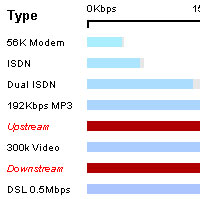 This is the second free upgrade that BT has introduced, with the telecoms giant upping the speed for all of its retail broadband customers back in February.
This is the second free upgrade that BT has introduced, with the telecoms giant upping the speed for all of its retail broadband customers back in February.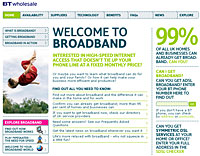 I quickly learnt that not only was I paying more than most, but my BT connection was as swift as a sleepy sloth on a hot day compared to the rocket-like speeds quoted by others.
I quickly learnt that not only was I paying more than most, but my BT connection was as swift as a sleepy sloth on a hot day compared to the rocket-like speeds quoted by others.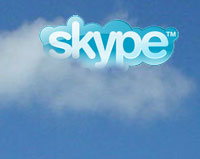 Skype has teamed up with The Cloud – Europe’s leading Wi-Fi network provider – to offer low cost Wi-Fi access and Internet voice calls at 6,000 of The Cloud’s hotspots in the UK and Sweden.
Skype has teamed up with The Cloud – Europe’s leading Wi-Fi network provider – to offer low cost Wi-Fi access and Internet voice calls at 6,000 of The Cloud’s hotspots in the UK and Sweden. Skype users ambling into a Cloud hotspot will be connected to the service as soon as they flip out their Wi-Fi enabled device.
Skype users ambling into a Cloud hotspot will be connected to the service as soon as they flip out their Wi-Fi enabled device.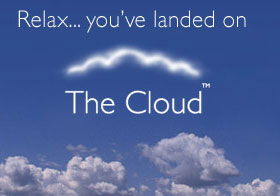 “Skype is bringing affordable Wi-Fi and voice calls to millions of users, enabling them to talk, IM and surf conveniently and cost-effectively from thousands of great locations. Our users in the UK and Sweden will benefit from The Cloud’s extensive network coverage in places where people really want to use it.”
“Skype is bringing affordable Wi-Fi and voice calls to millions of users, enabling them to talk, IM and surf conveniently and cost-effectively from thousands of great locations. Our users in the UK and Sweden will benefit from The Cloud’s extensive network coverage in places where people really want to use it.”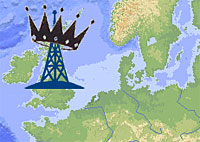 A report from consultancy firm BroadGroup has revealed that the deployment of wireless hotspots in Europe have soared by 67 percent in the six months up to May 2005.
A report from consultancy firm BroadGroup has revealed that the deployment of wireless hotspots in Europe have soared by 67 percent in the six months up to May 2005.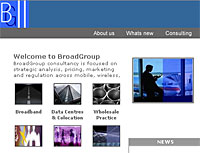 As many a disgruntled transatlantic traveller may tell you, Wi-Fi access in Europe still remains considerably more pricey than the US market, although the report suggests that “price declines are continuing to trend downwards” (I think this means, “prices are going down”).
As many a disgruntled transatlantic traveller may tell you, Wi-Fi access in Europe still remains considerably more pricey than the US market, although the report suggests that “price declines are continuing to trend downwards” (I think this means, “prices are going down”).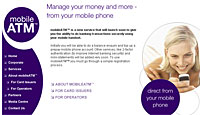 Cashpoint network The Link and IT bods Morse and have got together to launch a mobile banking service across the UK.
Cashpoint network The Link and IT bods Morse and have got together to launch a mobile banking service across the UK. Plans are afoot to extend the service to facilitate mobile payments direct from mobiles with customers being able to pay for items such as tube tickets and parking meters.
Plans are afoot to extend the service to facilitate mobile payments direct from mobiles with customers being able to pay for items such as tube tickets and parking meters. First Direct’s text messaging banking alert service has already proved a hit with their customers with 400,000 of its 1.2 million customers receiving balance statements by SMS.
First Direct’s text messaging banking alert service has already proved a hit with their customers with 400,000 of its 1.2 million customers receiving balance statements by SMS.